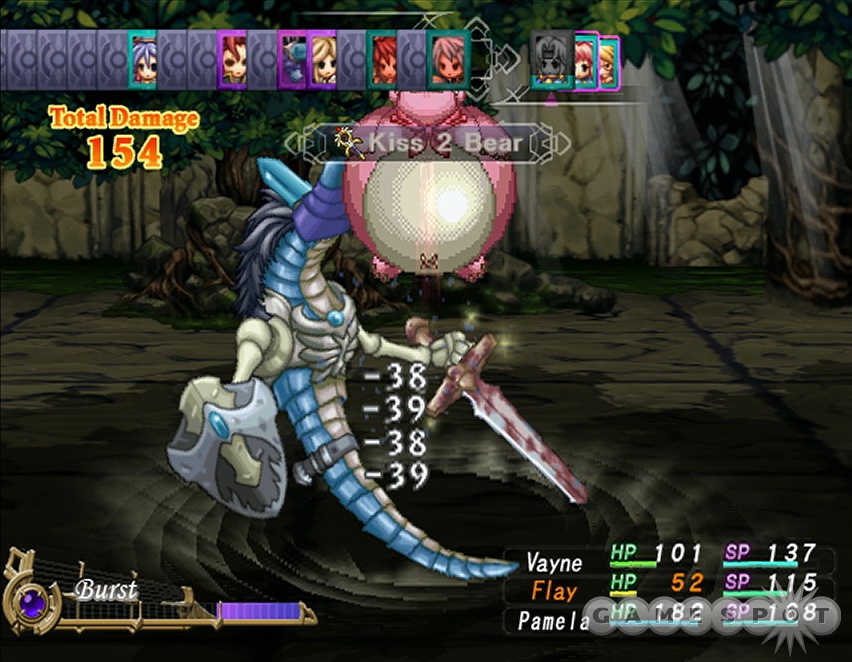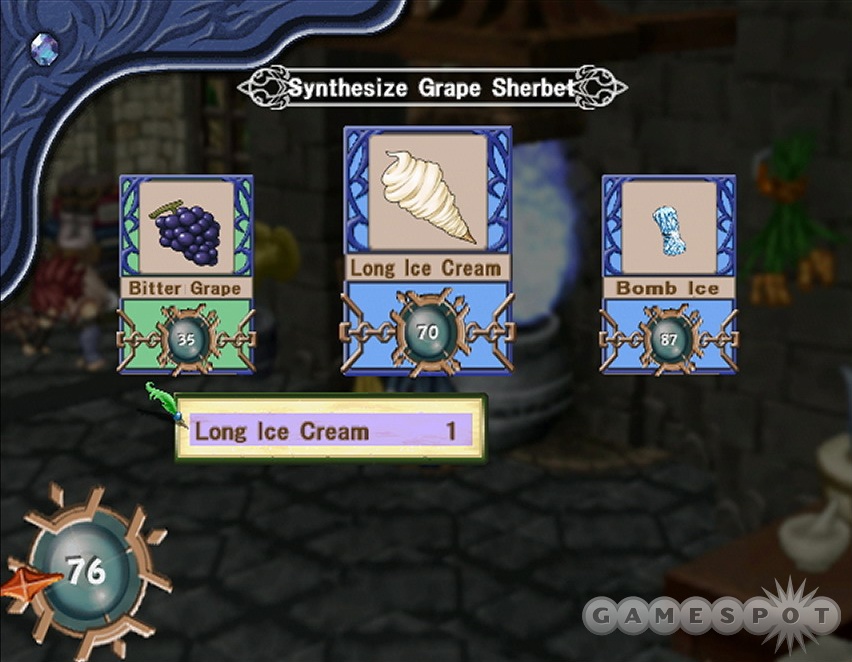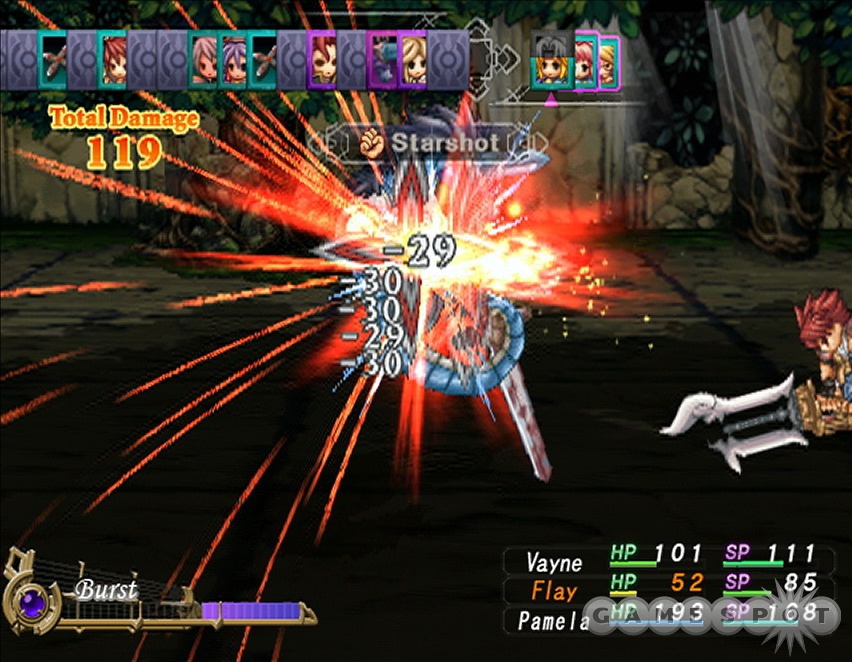Who hasn't looked at a piece of steak, a tangerine, a cup of flour, and some scrap metal and wondered how awesome it would be if you could create a powerful sword out of them? OK, so it may not be the first thing that comes to mind, but for those who wish that they could turn regular rocks into glistening gold, Mana Khemia may be the ticket to living out their greatest fantasies. Developer Gust has built a reputation on role-playing games heavy on the synthesis of items, and that mechanic has featured prominently in its Atelier Iris series. This time, item synthesis takes an even greater role, completely replacing the standard leveling of most RPGs. It takes a while to hit its stride, but once it does, Mana Khemia is a fun and involving experience that makes up for its lack of depth and beauty with a cauldron bubbling with witty charm and addictive questing.

Vayne Aurelius is a normal kid, or at least as normal as a teenage forest urchin can be. He's plucked from the tendrils of his simple existence and enrolled in a school dedicated to the study of alchemy, where students use their mystical talents to make everything from magical cheesecakes to killer decks of cards. To help him muddle through his angsty adolescence, Vayne joins a workshop headed by Flay, a self-important but lovable lunatic who fancies himself a masked superhero, among other things. Vayne also befriends a flirtatious cat-girl perpetually in heat, a pink-haired gal who's always blowing up the lab, a ghost that loves to scare unsuspecting freshmen, and several other equally amusing folk. Mana Khemia doesn't take itself seriously. After all, one of your party members is a tiny alien with a pom-pom growing from his head who floats around in a pot, and another plays baseball with a bear in the middle of combat. This outward humor makes the story feel initially lightweight, but as you learn more about Vayne's past and watch him interact with classmates like the insufferably haughty Roxis, these kooks are likely to get under your skin.
Synthesizing items is a fun and straightforward process. First, you need to find the recipe, which means a visit to one of the campus stores or the completion of a side job. You may also find recipes in treasure chests, new possibilities will be suggested by your friends, and you will discover original ones when you try substituting ingredients in known formulas. The ingredients themselves are earned as loot for defeating monsters, or by gathering them in your travels. You can dig up minerals, harvest radishes, fish for trout and seaweed, and even use a boomerang to collect apples and oranges. Once you've had your fill, you take your raw collectibles back to the workshop or to a machine called an athanor, perform an enjoyable little minigame to determine the quality of your product, and voila! You now have a set of kitty ears or a helping of broiled blowfish of your very own.
The process gets pretty involving. For example, that sledgehammer you want will require multiple ingredients that themselves must be synthesized from simpler items. However, alchemy doesn't just provide useful armor and weapons; it's also the only way to earn new skills and enhance your base statistics. Each character has a web of abilities eerily similar to Final Fantasy X's sphere grid. To unlock a set of skills, you need to transmute the item associated with them, and use action points earned from doing battle. There are no levels to gain in Mana Khemia.

The lack of leveling may be an original take on the RPG formula, but it's not always an asset. You must participate in combat to earn action points and gather loot, but without traditional experience, you don't get that feeling of accomplishment that accompanies each encounter. Given that you'll usually have more action points than you ever need at any given time, you'll probably avoid enemies rather than fight them. This issue is exacerbated by the game's annoying day-night cycle because foes become much more powerful when the sun goes down, and the amoeba-like avatars that represent encounters scurry around too quickly for you to avoid them. As a result, you'll park yourself in a safe spot and wait out the five or so real-time minutes that it takes for daylight to return.
It's too bad that Mana Khemia discourages you from combat in this manner, because battles are enjoyable once you get the ability to call in reinforcements. The core system is the familiar turn-based blueprint, but you can supplement the three active party members with sidelined characters, calling them forth during attacks to augment damage, replace party members low on health, and string together combos that unlock superpowerful burst abilities. This support system keeps you constantly engaged in combat, calling in the insatiable beast girl and her furry friends for some extra damage, and bringing in the snotty Roxis for defense. To help things along, the spells and attacks themselves are insanely entertaining to watch. For example, Pamela sends out her pink teddy-bear companion to suck up an enemy's health and pass it on to her. When she does so, her stuffed escort bloats up to enormous proportions before bellowing out the stolen health into her accepting mouth. Nikki plants a swollen seed that then develops into a gigantic tree that drops killer walnuts on your attackers. These and many other attacks are satisfying to watch but don't take up a lot of time, which keeps combat both entertaining and smoothly paced.
Mana Khemia will take most players 40 to 50 hours to complete, but it's not especially deep or challenging. The game pushes you from class to class, and once you're done completing tasks for your motley crew of peculiar professors, you get sections of free time for interacting with your peers, completing odd jobs, and getting stat bonuses by sending out the corpulent kid in the cafeteria to spread rumors about you. It also takes far too long to hit its stride, stalling for a dozen hours before pulling out its best tricks and filling out your party with its more fascinating members. Yet once it reaches that point, the game grabs you in spite of its quirks. Furthermore, the time you spend in exploration is nicely balanced by addictive trips to the cauldron, where the possibility of a new formula may be lurking within your pudding recipe.

Mana Khemia is not a looker, and fans of the Atelier Iris franchise will immediately recognize the dated two-dimensional visuals and colorful character sprites. Sprites aren't smoothly animated, your surroundings are rarely much to look at, and much of the 2D art is of uncomfortably low resolution. On the other hand, battles are brimming with vibrant personality, and they feature interesting-looking enemies and other beautifully drawn curiosities, from koala bears hanging from vines to destructive beams of light flashing from the moon itself. Unfortunately, the sound design is unlikely to inspire you. The jaunty, accordion-heavy soundtrack is eccentric but repetitive, and the main academy theme will get on your nerves after just a few hours. Some of the English voice acting is fine, particularly from the actors who portray Vayne and Roxis. Conversely, Flay's natural bravado is forced by the overachieving actor who voices him, while the girls range from annoyingly chirpy to superannoyingly chirpy.
With its interesting combat mechanics and layered alchemy system, Gust has created its best game yet, at least out of those released in North America. It has its flaws, and it won't challenge veteran role-players. Yet it's surprisingly clever and endearing, and offers an engaging experience that, though not quite classic, is addictive in all of the best ways.